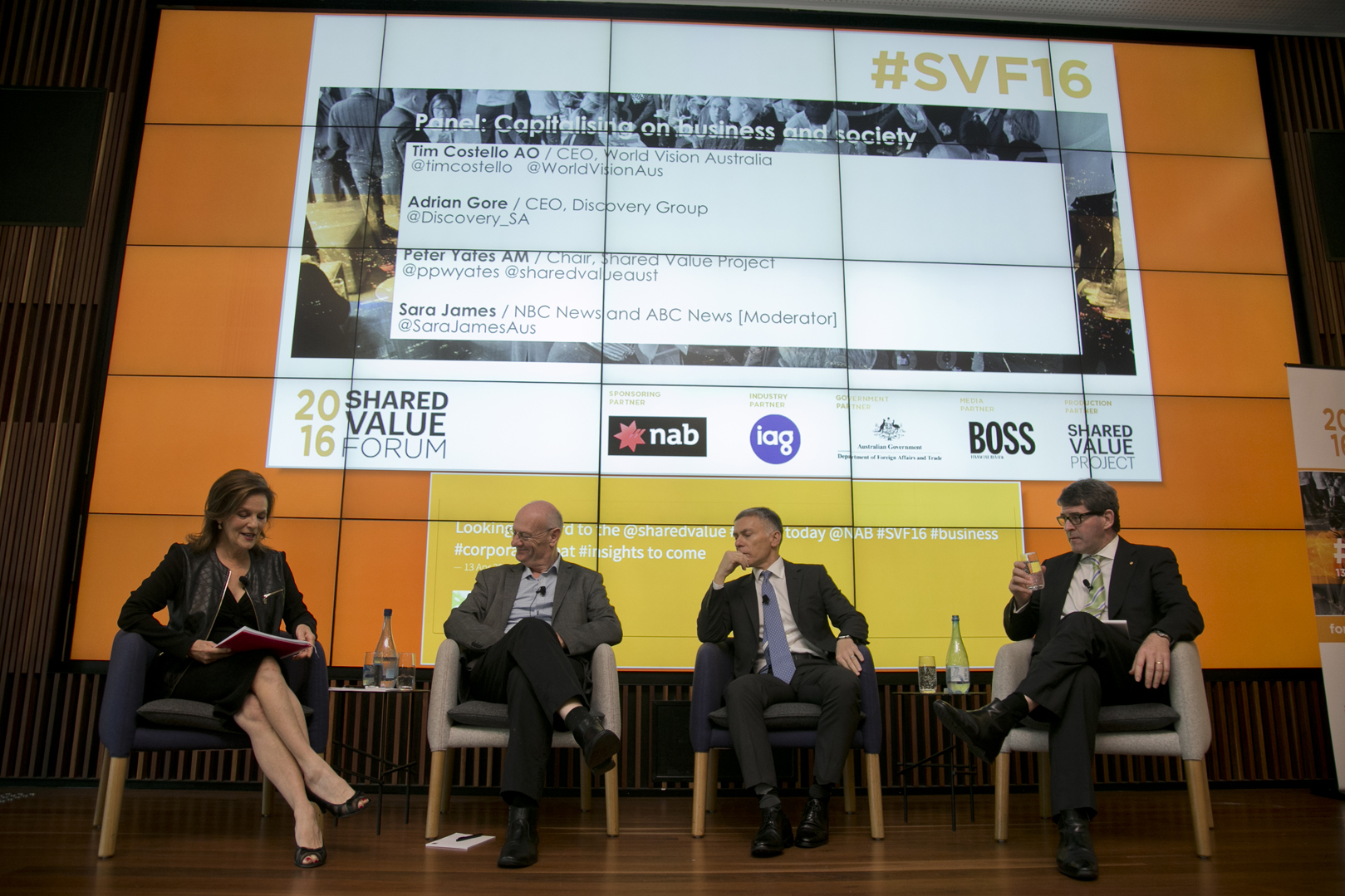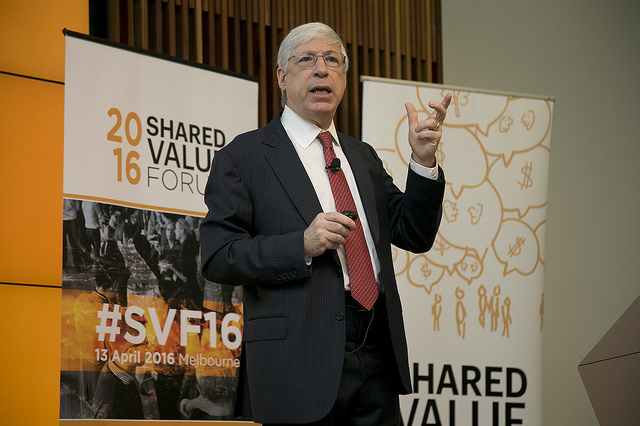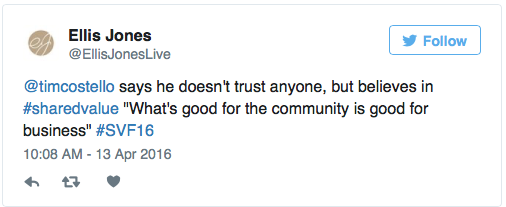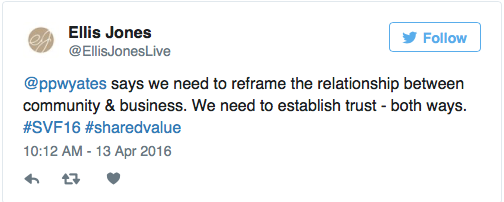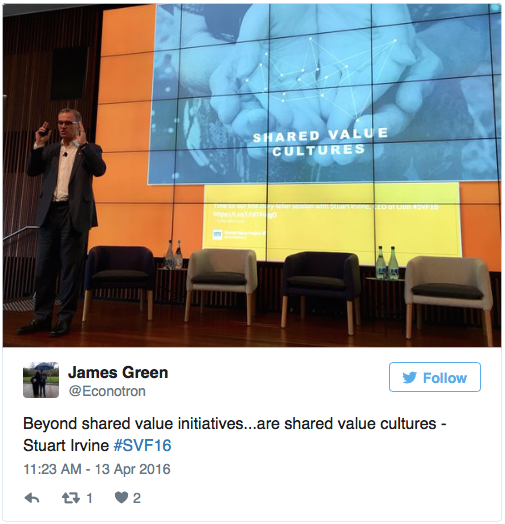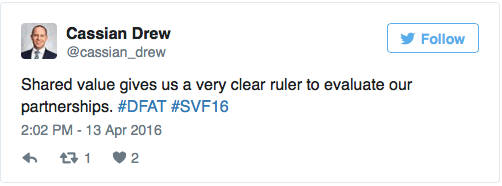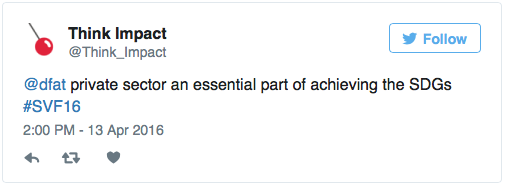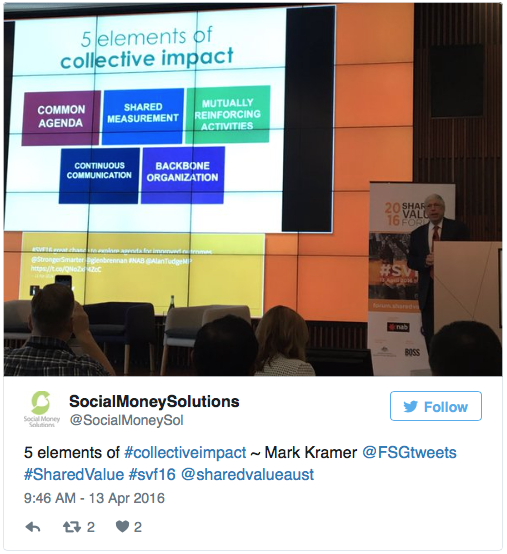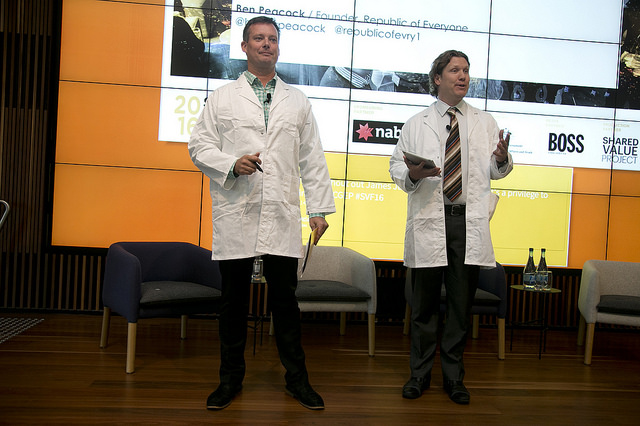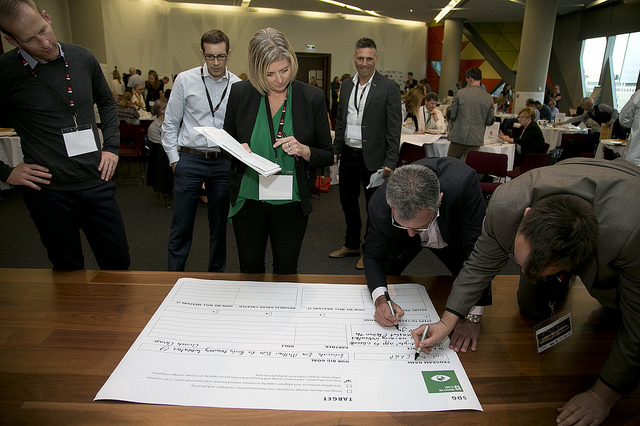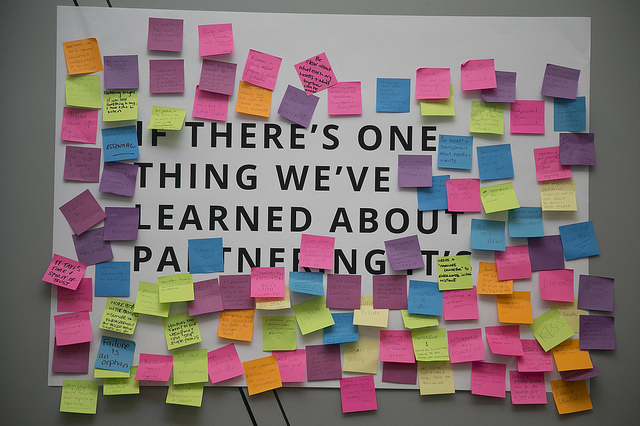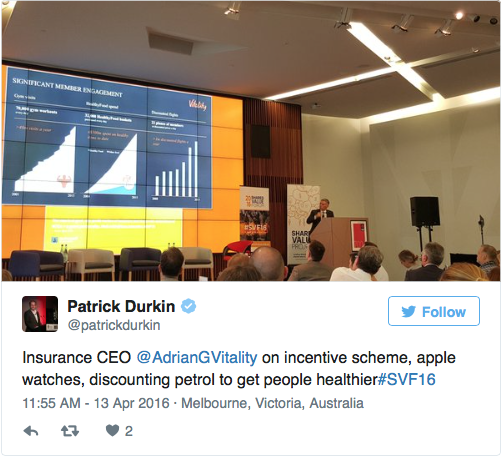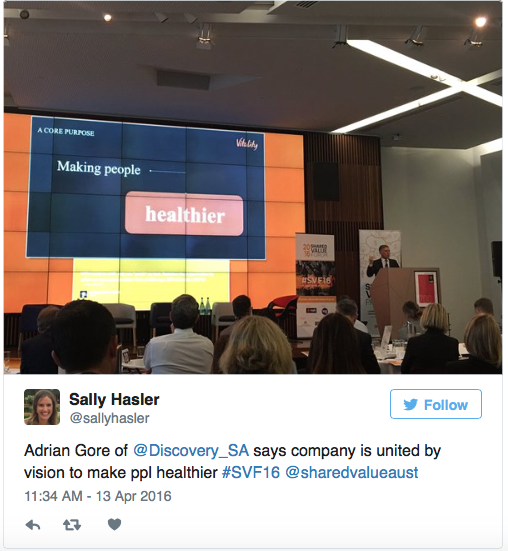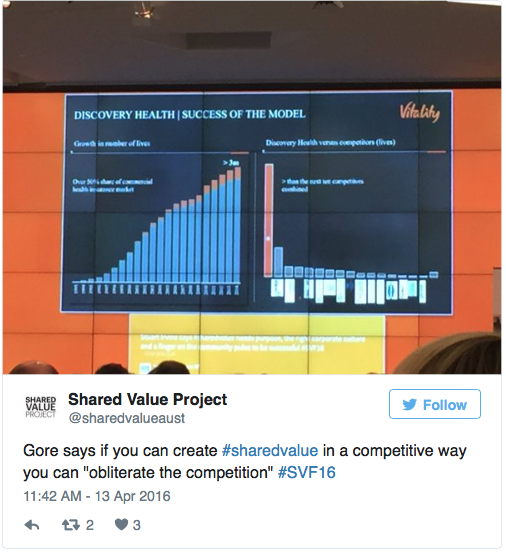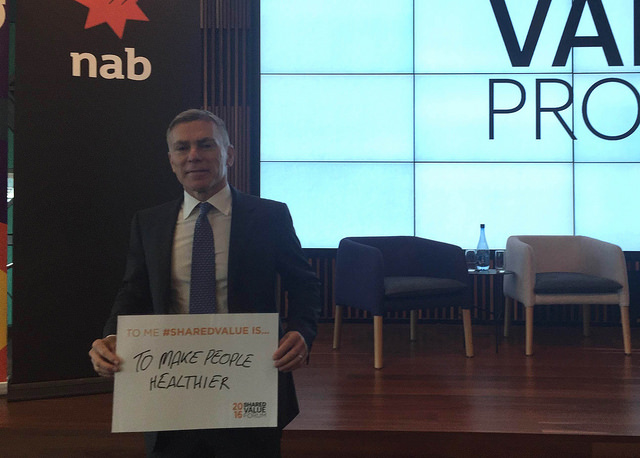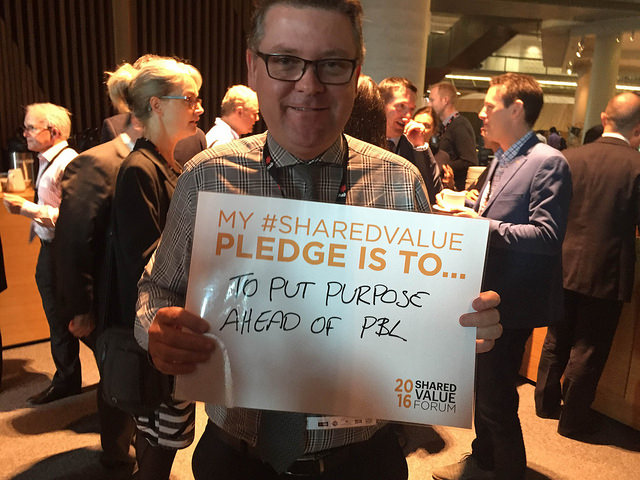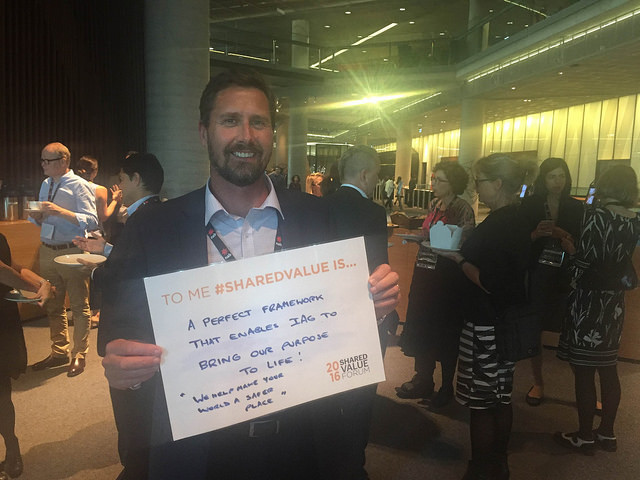At the 2016 Shared Value Forum, the richness of content, maturity of ideas, and new case studies made it clear that there is confidence in shared value as a framework and a strategy, and as Peeyush Guptor, Director of NAB recognised in his opening remarks, social needs are an integral part of economic thinking and shared value provides new pathways to achieving this.
Last Wednesday, 13 April, more than 170 leaders from business, government and the social sector came together with our partners NAB, IAG, DFAT and AFR BOSS to re-imagine how businesses can partner for change.
Tim Costello, CEO of World Vision, stated on the day “I think shared value gives us the best hope…the great challenges facing us really need shared value”.
Peter Yates AM, Chair of the Shared Value Project summed up the day by making the point that business gets it and has enough of a case, not-for-profits (NFPs) are beginning to engage, and government is excited about it. This is about rewiring the system.
Read more below for key themes and highlights from the day:
See the conversations and the day as it unfolded on Storify
A global update from Mark Kramer
We welcomed back Mark Kramer, co-author of ‘Creating Shared Value’ to Australia, who emphasised the systems change needed in leveraging shared value opportunities that set up the rest of the discussions for the day:
- Shared value requires leadership to have a long-term vision
- Corporate success depends on a complex operating environment. Social issues affect business performance and are therefore market opportunities
- Business has the money on the line, therefore they are the ones who can lead social progress and social change
- Shared value gives NFPs and philanthropists new ways to partner with business to achieve impact.
- Companies need to overcome five obstacles to lead others in collective impact: a philanthropy only mindset, free-riders, distrust, short-termism, system leadership.
Trust and authenticity
Speakers throughout the day emphasised the importance of trust and authenticity amongst all stakeholders for shared value to really flourish, and to help business build better relationships.
- Peeyush Gupta from NAB suggested in his welcome that trust and accountability from investors and government is needed, and that shared value enables the bank to be the most respected bank, delivering strong business results against social objectives.
- Peter Yates noted on the first panel around leadership that shared value plays an important role in building trust between the community and business.
- Peter gave the example for the insurance industry and how trust becomes cyclical – if policy is too complex to start off with for a customer, this will then be reflected in customer service teams and trust starts to break down through each level of the business. A vicious cycle that can also affect the language used by leaders.
- Damian Mu, CEO of AIA Australia, said in his introduction that good companies know what they do, great companies do what they say, and that “authenticity and simplicity is powerful and critical”.
- Tim Costello stated that “trust I think is really the big challenge [in addressing societal problems]”, whilst Stuart Irvine, CEO of Lion expressed that self-interest quickly destroys trust.
A culture for change
An important part of catalysing shared value is culture. Culture amongst the business community where this way of thinking needs to become business as usual which we are seeing through demands from consumers and a generational shift in the workforce. This culture of change is also incredibly important internally within businesses in order for operations and systems to be innovative and employees engaged towards a strong core purpose that is connected to meeting societal needs.
- Tim Costello – “People have jobs that are not big enough for their spirits”…the shared value concept speaks this.
- Stuart Irvine, CEO of Lion, said in his Storyteller presentation that shared value needs purpose, the right corporate culture and a finger on the community pulse to be successful. Lion makes decisions based on their purpose everyday.
- Stuart noted that 51 of the world’s 100 largest economies are corporations, and therefore the potential that they could have.
- Adrian Gore, CEO of Discovery Group, expressed that “smart, good people are drawn to companies with a strong social purpose”, and described how creating an internal system, rhythm and incentives for innovation is key to long-term success.
- Damien Mu says he wants to see shared value become “just the way we do things”.
- Rosemary Addis, Chair of Impact Investing Australia, emphasised that we need to not only focus on forums and initiatives, but create cultural change and make this business as usual.
Government – a key player in creating share value
At last year’s forum, discussions revolved heavily around the question of “what is the role of government?” Over the past year the dialogue has noticeably progressed though the leadership role that DFAT has taken in implementing ‘Creating Shared Value Through Partnerships’ and taking on shared value frameworks to leverage opportunities to collaborate with the corporate sector and NFPs around key social issues.
- In the spotlight on DFAT, Simon Cramp, Director of Private Sector Development, described how shared value has defined a new method of engaging with businesses in community development and aid. A method that defines the parameters of engagement and encourages scale and longevity through having profit in the conversation from the start.
- Simon described how shared value was the key to unlocking new policy opportunities for DFAT, and created a very clear ruler to evaluate and develop more productive partnerships.
- Simon announced DFAT as a proud to new member of the Shared Value Project and encouraged others organisations across all sectors to get involved.
Collaboration and collective impact
Throughout the day there was a clear consensus that no one organisation or sector can genuinely address a social issue on its own. Shared value requires corporates, NFPs, and government to work together in order to initiate the best opportunities and create change.
- In his keynote Mark Kramer highlighted the concept of Collective Impact, which struck a cord with attendees as a way of approaching social issues and hence work collectively towards creating shared value. Collective Impact is the commitment of a group of important actors from different sectors to a common agenda for solving a specific social problem.
- Adrian Gore, CEO of Discovery Group in South Africa, emphasised on the first panel that the ability to scale shared value globally cannot be done without partnerships.
- On the second panel focusing on partnerships, Jacki Johnson, Group Executive People, Performance and Reputation at IAG, reflected on the Christchurch earthquakes during her time as CEO of IAG New Zealand, and how important it was to work collectively with business and government to recover.
- Jacki also asked the important question around how are university business schools creating graduates that view business purpose beyond profit maximisation, as all groups play a role.
- Annabelle Butler from Suncorp Group explained in her storyteller session that they couldn’t have created their Australian-first insurance product for people on low income without their partner Good Shepherd Microfinance.
- Attendees put this thinking in to practice during the interactive lab session with Ramana James from IAG and Ben Peacock from Republic of Everyone, where teams designed a profitable program to address one of the UN Sustainable Development Goals whilst playing simulated roles across different sectors.
- Following the interactive lab we heard from attendees that “if there’s one thing we’ve learned about partnering it’s”…ensuring there is a shared vision, listen to each other, a broker and facilitation is essential, commercial motivation helps with clarity, and being honest and transparent about each others needs and wants.
Regional opportunities
This year we broadened the discussion around the greater Asia-Pacific region to highlight what shared value opportunities there are for Australian companies, what social issues need to be addressed, and what are our core capabilities as part of the global shared value movement.
- Simon Cramp from DFAT emphasised that the SDG’s put businesses as a central part of social development in the region.
- Damien Mu noted on the third panel that Asia is made up lot of different countries who are all incredibly different with their own set of issues and way of doing business and therefore need their own unique approach by Australian businesses.
- Damien also highlighted health, education, and infrastructure as the three key areas where the most opportunities exist for shared value in Asia.
- Richard Welford, Chairman of CSR Asia, noted the growing trend of ‘social innovation’, and the immense potential if we put that lens over shared value, noting Hitachi as a leading company in the region already doing this. A particularly relevant point for Australia given the current dialogue around the Innovation Statement.
- Richard also emphasised that shared value gives businesses a social license to operate, which is crucial for global organisations.
Leaders and pledges
This year we welcomed Adrian Gore, CEO of Discovery Group from South Africa who delivered a keynote on the Vitality story – incentivising customers to live healthier lives and create a competitive advantage for the business.
Once participants had submitted their thoughts on partnerships in the interactive lab they received a one off #SVF16 Mark Kramer badge.
This year we asked attendees to share their highlights, shared value pledges, and what shared value means to them. Se some of the highlights below.
Adrian Gore, CEO of Discovery
Chris Newlan from Challenger
Shaun O’Brien from IAG
